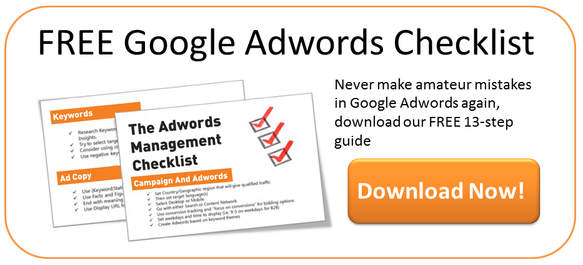3 Fatal Google AdWords Mistakes Most Small Businesses Are Making!
 Unfortunately, many small businesses come away with burned fingers from their first experience with Google AdWords. This is sometimes enough to dissuade them from using PPC altogether, although this would be a mistake. Disappointing results from PPC do not mean that the method is unsuited to your business model or that it’s not cost-effective. Rather, high costs or low returns can often be traced back to a handful of common Google AdWords mistakes; specifically to the use or misuse of keywords.
Unfortunately, many small businesses come away with burned fingers from their first experience with Google AdWords. This is sometimes enough to dissuade them from using PPC altogether, although this would be a mistake. Disappointing results from PPC do not mean that the method is unsuited to your business model or that it’s not cost-effective. Rather, high costs or low returns can often be traced back to a handful of common Google AdWords mistakes; specifically to the use or misuse of keywords.
In this article we examine three of the most pernicious keyword-based AdWords mistakes that small businesses make, describing how they can be avoided when running your own campaigns.
1) Not Understanding Keyword Matches
PPC is a keyword marketing tool, so it’s not a surprise that the biggest Google AdWords mistake small businesses make is choosing the wrong balance of keyword matches. For most companies, it wouldn’t take too long to jot down half a dozen decent keywords or search terms, based on the knowledge of their business. These can then be verified or checked, based on search traffic, using a keyword tool.
However, this is only part of the story. Keyword strategy in AdWords depends on keyword matches. A keyword can be either a…
- Broad match
- Phrase match
- Exact match
A broad match keyword will display on all search results that relate to the exact phrase or any permutations of it within the keyword group. For example, let’s take the keyword cheap car insurance.
This advert would display for people Googling cheap car insurance and also for any of the following:
- Cheap car insurance deals
- Best car insurance offers
- Cheap Admiral car insurance
- Car insurance cheap
- Car insurance offers
If you are after maximum exposure, then broad matches are the keywords to use, as they’ll display your advert to the widest number of potential customers and could increase your total number of clicks. Some experts have estimated that the potential clicks for broad matches are 94% higher than those for exact matches.
The downside of broad match keywords is that your adverts will display to people who are not directly interested in your products, or who are not ready to buy. This can lead to a drop in your conversion rate, and if you’re not careful, to an increased cost per click.
To compensate for this, you can use phrase match keywords. You choose these by entering a keyword search term in parentheses e.g. “Cheap car insurance”. Now your advert will only display for viewers who search for your keyword in the correct word order. However, you will also get traffic from people who add additional words to the search term, such as purchase cheap car insurance, or cheap car insurance UK. A selection of phrase matches will boost your conversion rate while still yielding you up to 35% more clicks than exact matches.
Exact match keywords are entered in square brackets and capture traffic only for people searching for – you guessed it – the precise search term in the order you enter it. For instance [bargain golf bags UK] will display only to people searching for that term, and no one else. These keywords generate the lowest number of clicks, but potentially the highest number of conversions, so long as they’re chosen wisely.
Learn more about the different match types with this article - A Guide to Keyword Match Types in Google AdWords.
2) Implementing A Poor Keyword Strategy
The goal with successful PPC is to keep your click through rate (CTR) and revenue per click (RPC) as high as possible, while keeping your cost per click (CPC) low. This is strongly influenced by the keyword matches you choose. Getting your choices wrong, by using too many broad matches or the wrong choice of exact matches, will result in rising CPC and a reduced CTR and/or RPC.
You need to set up a balanced keyword match strategy that works for you, and this should be regularly adjusted based on the results that start coming through. Some small businesses panic and focus too much attention on broad match keywords, too early in the game. The assumption here is that traffic is the most important thing. It’s not; the end goal is increased revenue and profitability through a high conversion rate.
Therefore, the best approach is to start with exact matches, adding phrase matches and broad matches to the campaign gradually if you are not getting enough clicks and conversions from your exact keywords to meet your campaign targets. This is a fast way to get better results from AdWords, and is the opposite approach to that taken by most small businesses starting PPC for the first time.
It is also one of the reasons it’s really useful to have a campaign partner such as JDR onside to help you manage your PPC campaigns. Returns from the right keyword matches can be phenomenal, while the wrong approach can end up costing you more money.
3) Poor Use Of Negative Keywords
Negative keywords are one of the most useful, but most frequently overlooked features of Google AdWords. Negative keywords exclude searches that don’t fit in with your offering. This is important, because Google adds an average of 900,000 new keywords to its databank each day. There is a high chance that many search terms, while including your keyword phrase, may have nothing whatsoever to do with your business.
For example, if advertising for copywriting services it may be sensible to include copywriting careers and copywriting jobs as negative keywords, so you attract companies looking for writers, rather than writers looking for jobs.
By ring fencing your keywords to exclude searches that your advert will not display on, you can lower your CPC, increase your Quality Score and boost your conversion rate. Learn more about Quality Score with this article - What Is Google AdWords Quality Score And Why Does It Matter?
A FREE AdWords Checklist
Regardless of your niche, any small business can get great results from Google AdWords if you pay attention to keyword strategy and a number of other important factors. Whether or not you currently use PPC, our free Google AdWords Checklist is a useful resource to help you determine if you could be getting better results from your paid digital ads. Simply click here to claim your copy, or feel free to give one of our team a call on 01332 343 281 if you have any questions.


